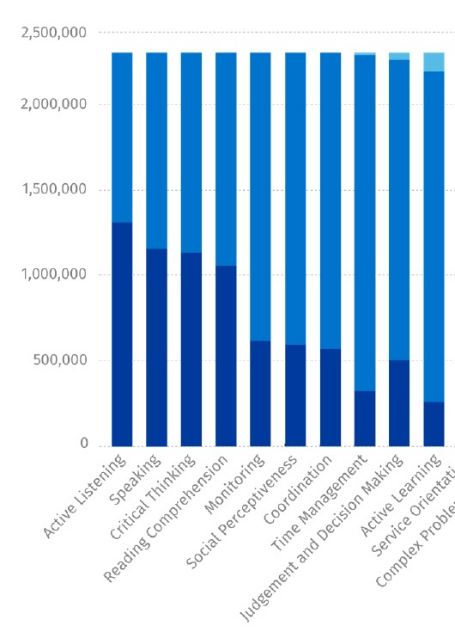Lesson 1 - Skills Needed in a Digital Age
| Site: | Technology-Enabled Learning Lounge |
| Course: | Teaching in a Digital Age |
| Book: | Lesson 1 - Skills Needed in a Digital Age |
| Printed by: | Guest user |
| Date: | Saturday, 31 January 2026, 5:19 AM |
Table of contents
- 1. Watch this Video on Skills Needed in a Digital Age
- 2. The Growing Importance of Skills Development
- 3. The Needs of a Digital Society
- 4. What Skills?
- 5. Developing Skills
- 6. Measuring Skills
- 7. Skills and Learning Outcomes
- 8. Rethinking Teaching and Learning
- 9. Activity (Reflective Thinking, Note Taking and Discussion)
- 10. Key Takeaways
1. Watch this Video on Skills Needed in a Digital Age
2. The Growing Importance of Skills Development
Knowledge involves two strongly inter-linked but different components such as content and skills. Content includes facts, ideas, principles, evidence, and descriptions of processes or procedures. Most instructors, at least in universities, are well trained in content and have a deep understanding of the subject areas in which they are teaching. Expertise in skills development though is another matter. The issue here is not so much that instructors do not help students develop skills, they do help, but whether these intellectual skills match the needs of knowledge-based workers, and whether enough emphasis is given to skills development within the curriculum.

3. The Needs of a Digital Society
Prediction is always risky, but usually the big trends in the future can already be seen in the present. The future will merely magnify these current conditions, or current conditions will result in a transformation that we can see coming but are not here yet.
Some examples:
- The Internet of Things where almost everything is digitally connected
- Autonomous vehicles and transportation
- Massive amounts of data about our personal lives being collected and analyzed to anticipate/predict/influence our future behavior
- Automation replacing and/or transforming human work and leisure
- State agencies and/or commercial oligopolies controlling access to and use of data
- Lack of transparency, corruption of messaging, and magnification of these distortions, in digital communications
One thing is clear. We can either as individuals throw up our hands and leave all these developments to either state or commercial entities to manage in their own interests, or we can try to prepare ourselves so that we can influence or even control how these developments are managed, for the greater good.
This is what I mean when I talk about developing 21st Century skills or preparing for a digital society. We have a responsibility for ensuring our students are educated sufficiently so that they understand these issues and have the means by which to address them. This is the responsibility of every educator because it affects all areas of knowledge.
For instance, the science professor needs to instill in her students an ability to identify reliable and unreliable sources of scientific data, and an ability to apply that knowledge in ethical ways that benefit mankind. This is a particularly important responsibility for those teaching computer sciences. We need to teach about the dangers of unintended or unknown consequences of artificial intelligence applications and of automated analyses of mass data, potential biases in algorithms, and the need to audit and adjust automated procedures to avoid unforeseen but harmful consequences before they do damage.
Digital (rather than purely online) learning has a critical role to play, because in order to develop these skills our students’ learning itself needs to be digitally embedded. Only by mastering technology can we control it.
4. What Skills?
The skills required in a knowledge society include the following:
- Communications Skills: As well as the traditional communication skills of reading, speaking, and writing coherently and clearly, we need to add social media communication skills. These might include the ability to create a short YouTube video to capture the demonstration of a process or to make a sales pitch, the ability to reach out through the Internet to a wide community of people with one’s ideas, to receive and incorporate feedback, to share information appropriately, to identify trends and ideas from elsewhere.
- Ability to Learn Independently: This means taking responsibility for working out what you need to know, and where to find that knowledge. This is an ongoing process in knowledge-based work because the knowledge base is constantly changing. Incidentally, I am not talking here necessarily of academic knowledge, although that too is changing; it could be learning about new equipment, new ways of doing things, or learning who are the people you need to know to get the job done.
- Ethics and Responsibility: This is required to build trust (particularly important in informal social networks), but also because generally ethical and responsible behavior is in the long run more effective in a world where there are many different players and a greater degree of reliance on others to accomplish one’s own goals.
- Teamwork and Flexibility: Although many knowledge workers work independently or in very small companies, they depend heavily on collaboration and the sharing of knowledge with others in related but independent organizations. In small companies, it is essential that all employees work closely together, share the same vision for a company, and help each other out. In particular, knowledge workers need to know how to work collaboratively, virtually, and at a distance, with colleagues, clients, and partners. The ‘pooling’ of collective knowledge, problem-solving, and implementation requires good teamwork and flexibility in taking on tasks or solving problems that may be outside a narrow job definition but necessary for success.
- Thinking Skills (Critical Thinking, Problem-solving, Creativity, Originality and Strategizing): Of all the skills needed in a knowledge-based society, these are the most important. Businesses increasingly depend on the creation of new products, new services, and new processes to keep down costs and increase competitiveness. Also, it is not just in the higher management positions that these skills are required. Trade people in particular, are increasingly having to be problem-solvers rather than following standard processes, which tend to become automated. Anyone dealing with the public in a service function must identify needs and find appropriate solutions. Universities in particular, have always prided themselves on teaching such intellectual skills, but the move to larger classes and more information transmission, especially at the undergraduate level, undermines this assumption.
- Digital Skills: Most knowledge-based activities depend heavily on the use of technology. However, the key issue is that these skills need to be embedded within the knowledge domain in which the activity takes place. This means for instance real estate agents knowing how to use geographical information systems to identify sales trends and prices in different geographical locations, welders knowing how to use computers to control robots examining and repairing pipes, radiologists knowing how to use new technologies that ‘read’ and analyze MRI scans. Thus, the use of digital technology needs to be integrated with and evaluated through the knowledge base of the subject area.
- Knowledge Management: This is perhaps the most over-arching of all the skills. Knowledge is not only rapidly changing with new research, new developments, and rapid dissemination of ideas and practices over the Internet, but the sources of information are increasing, with a great deal of variability in the reliability or validity of the information. Thus, the knowledge that an engineer learns at university can quickly become obsolete. There is so much information now in the health area that it is impossible for a medical student to master all drug treatments, medical procedures, and emerging science such as genetic engineering, even within an eight-year program. Thus, knowledge management is the key skill in a knowledge-based society: how to find, evaluate, analyze, apply, and disseminate information, within a particular context. Above all students need to know how to validate or challenge sources of information. Effective knowledge management is a skill that all graduates will need to employ long after graduation.
4.1. Humans Wanted
In 2018, the Royal Bank of Canada issued a report, called ‘Humans Wanted.’ This was based on an analysis of big data derived from job postings over a 12 month period on LinkedIn, in which the actual skills being requested by employers were identified and analyzed, and from which an analysis of the demand for different types of labor were conducted.
The main conclusion of the report was that there will be plenty of jobs in the future, but they will require different skills from those generally required at the present. In particular, many of the new skills needed will be what is perhaps confusingly called soft skills, such as attentive listening, critical thinking, digital fluency, active learning, etc. (confusing, because these ‘soft skills’ are often as difficult to cultivate as ‘hard skills’.) These are skills that automation and AI cannot easily replicate or replace but which will be needed in the new digital economy. The Royal Bank identified the following as key skills that will be in high demand between 2018 and 2023 (Dark blue = Very important; Lighter blue = Important).

Two of the main conclusions from the Royal Bank report were as follows:
- Canada’s education system, training programs, and labor market initiatives are inadequately designed to help Canadian youth navigate this new skills economy.
- Canadian employers are generally not prepared, through hiring, training or retraining, to recruit and develop the skills needed to make their organizations more competitive in a digital economy.
5. Developing Skills
What methods of teaching are most likely to develop soft skills?
In fact, we can learn a lot from research about skills and skill development (see, for instance, Fischer, 1980, Fallow and Steven, 2000):
- Skills development is relatively context specific. In other words, skills need to be embedded within a knowledge domain. For example, problem-solving in medicine is different from problem-solving in business. First of all, of course, the content base used to solve problems is different. Less well understood though is that somewhat different processes and approaches are used to solve problems in these domains (for instance, decision-making in medicine tends to be more deductive, business more intuitive; medicine is more risk-averse, business is more likely to accept a solution that will contain a higher element of risk or uncertainty). Embedding skills within a particular context such as a subject discipline is perhaps the biggest challenge for educational institutions in a digital age. How well does an ability to think critically about English literature transfer to other areas of critical thinking, such as political analysis or assessing the behavior of a workplace colleague? In many cases, some elements of these soft skills do transfer well but other parts are more context-specific. More attention needs to be paid to what is known about the transfer of skills, based on research, and to ensure this evidence affects the way we teach.
- Learners need practice – often a good deal of practice – to reach mastery and consistency in a particular skill.
- Skills are often best learned in relatively small steps, with ‘jumps’ increasing as mastery is approached.
- Learners need feedback on a regular basis to learn skills quickly and effectively; immediate feedback is usually better than late feedback.
- Although skills can be learned by trial and error without the intervention of a teacher, coach, or technology, skills development can be greatly enhanced or speeded up with appropriate interventions, which means adopting appropriate teaching methods and technologies for skills development.
- We shall see later that although content can be transmitted equally effectively through a wide range of media, skills development is much more tied to specific teaching approaches and technologies.
What are the implications of this for not only teaching methods, but also curriculum design? It is worth remembering that unlike competencies, many ‘high-level’ soft skills such as critical thinking are cumulative and do not have a clear endpoint. Serena Williams keeps winning not because she continues to get faster and stronger than younger players, but because she continues to hone her skills (including strategy) to a level that compensates for her diminishing strength and speed.
Soft skills need to be developed over a program (indeed a lifetime) rather than in a single course. How do we identify then how to build critical thinking skills for example from the first year through to graduation in a particular discipline? How does the development of skills in later stages build on work done earlier in a program?
6. Measuring Skills
Another challenge is measuring skills. I was once questioned by a colleague when I said my students were learning to think critically.
‘How do you know?’ he said.
My answer was: ‘I know it when I see it in their assessments.’
‘But how will your students know what you are looking for if you can’t describe it in advance?’
The Higher Education Quality Council of Ontario (HEQCO) published a report in 2018 that claimed to be ‘one of the first major attempts to measure employment-related skills in university and college students on a large scale’. The second study used a test designed to evaluate students’ ability to analyze evidence, understand implications and consequences, and develop valid arguments.
The HEQCO study concluded that final-year students had somewhat higher scores in literacy and numeracy than their first-year counterparts, although there was considerable variation among programs, but little difference between the test scores of incoming and graduating students in critical-thinking abilities, although critical thinking ability too showed considerable variation among programs.
There are a number of possible criticisms of this study. One of the challenges that the HEQCO study faced was finding valid and reliable ways to assess soft skills. The first study measured literacy, numeracy, and problem-solving abilities of adults using everyday scenarios. Why assess these skills outside the knowledge domains in which they were taught, given the importance of context? Were the measurements sensitive enough to really discriminate differences in skill development over time?
Nevertheless, it is worrying that HEQCO found that after four years of post-secondary study there was no noticeable difference in critical thinking skills. Is this because this is not being well taught, or because the tests used were not valid? Any attempt to identify learning outcomes involving skills requires consideration from the beginning of how these skills can validly be assessed. Instructors should not complain about HEQCO’s assessment methods if they cannot justify their own methods of identifying and assessing skills.
7. Skills and Learning Outcomes
The Royal Bank of Canada and the HEQCO studies both highlight that it is becoming increasingly important to define learning outcomes in terms of skills acquisition. Both these are valuable studies that identify some of the issues around developing the knowledge and skills that students will need to succeed, not just in the workforce, but in life generally in the last three-quarters of this century. However, the two reports have barely touched the tip of this particular iceberg. Neither for instance attempted to suggest how students can develop these skills or what instructors need to do to help students develop such skills.
When developing curricular, in terms of deciding not only what but also how to teach, we need to ask the following questions:
- Are programs identifying clearly the learning outcomes expected from a program of study?
- Do these learning outcomes sufficiently take into account skills as well as content/topics?
- Are these learning outcomes relevant for a digital society?
In other words, we have a major pedagogical challenge in several parts:
- Identifying the most important soft skills that students will need (although the RBC report goes a little way in that direction)
- Identifying the best way to teach such soft skills
- Assessing students’ ability in soft skills (although the HEQCO report similarly goes a little way in that direction)
- Identifying the extent to which soft skills are generalizable
The key point here is that content and skills are tightly related and as much attention needs to be given to skills development as to content acquisition to ensure that learners graduate with the necessary knowledge and skills for a digital age.
8. Rethinking Teaching and Learning
These are essentially curriculum and pedagogical issues. It means rethinking not only the curriculum and how we teach it but also the role that technology can play in developing such skills. How can technology increase empathy and understanding (for example, through creating virtual environments or simulations where students play the role of others)? How can technology be used to provide scenarios that enable skills development and testing in a safe environment? How can technology be used to enable students to solve real-world problems?
There are a million possible answers to such questions, and they need to be answered by instructors and teachers – and by learners – with deep understanding of their subject matter. But subject knowledge alone is not enough if we are to make the last three-quarters of the 21st century a time when all people can thrive and feel free.
9. Activity (Reflective Thinking, Note Taking and Discussion)
This activity is optional. It is presented to facilitate your reflective thinking on the issues. There is no feedback. We encourage you to discuss these with your colleague.
What skills are you developing in your students?
1. Write down a list of skills you would expect students to develop as a result of studying your courses.
2. Compare these skills to the ones discussed in this lesson. How well do they match?
3. What do you do as an instructor that enables students to practice or develop the skills you have identified?
10. Key Takeaways
 |
Key takeaways from this lesson are:
|
|---|